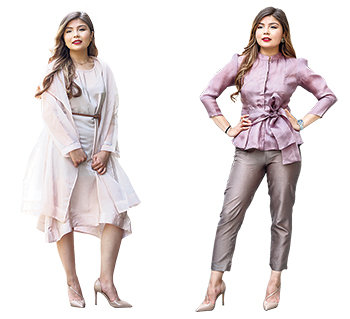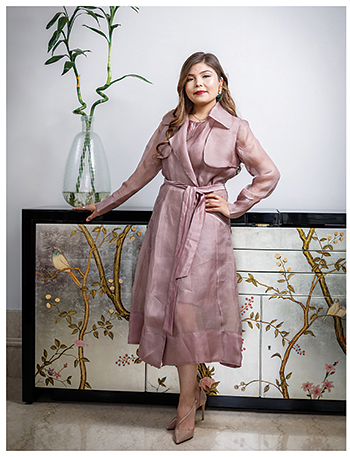Traditionally and culturally speaking, our clothes and the dressing style are heavily dependent on natural fibers. Moreover, our parents and grandparents have always been wearing tailored clothes and this wave of fast, ready-made fashion only started a few decades ago due to the advent of globalization. However, now we know just how non-ecofriendly and straining readymade, fast fashion can be. Maybe this is why fashion-forward people have started to drift more towards customized and tailored products that, along with being sustainably made, are cruelty-free and minimalistic in nature.
Kargha, a fashion house based in Kathmandu, is here to cater to such people. It was started by Sonal Agarwal and Sanchita Agarwal in 2017. “The concept of Kargha came about in 2016 but we could only start operations by mid-2017 as there was a lot of logistics to work on,” says Sonal.
Sanchita and Sonal, who met through their husbands, had always been interested in fashion. After meeting for the first time, Sonal says that they hit it off instantly and shared a mutual interest in clothing aesthetics, both having different but equally experimental style.

How it all started
At a local fashion event, when the duo was asked about the fashion industry in Nepal and where they would you like to see it in five years’ time, it occurred to them that compared to the neighboring countries or other Asian countries, a homegrown fashion brand in Nepal was almost non-existent, with only a few exceptions.
“For years, we were always disappointed by the limited choices in terms of sizes and styles available locally and so we sat ourselves down and decided we should maybe try our hand at it. That’s how Kargha started,” says Sonal.
To put it simply, Sonal claims that Kargha believes in going back to basics in terms of fabrics by using natural fibers like cotton, silk organza, chanderi, tissue fabric etc. “We love working clever pattern-cuts that make our clothes stand out and are fuss-free and minimalistic at the same time,” she says. Their design philosophy is pretty simple “Please wear your clothes and don’t let the clothes wear you(out)”.
One important thing that Sonal notes is that Kargha caters to a niche group of people—those who are willing to pay a bit more for proper quality and well-paid labor. “Our sustainability efforts make our clothes more expensive compared to fast fashion clothes,” she admits. However, she adds that their business philosophy involves encouraging clients to buy less but buy quality products that can last a long time.
Women entrepreneurs need support to sustain their businesses: F...

Though it may be a little on the expensive side, the duo thinks that the customers have to keep mind that when you pay a little more, you get quality products and someone gets paid a better wage. Kargha also doesn’t have a store because having a store would mean updating and having a constant stock which the duo believes would cause surplus production and environmental waste. And so, if anyone is interested in buying something made by Kargha, they meet people on an appointment basis and try their best to customize outfits on the basis of a client’s taste and requirements.
As Kargha mainly deals with customization and tailoring, you can ask for any design you want, be it a lehenga, an evening dress or a tailored coat. “They can choose from an array of natural fibers from which to make their clothes and we make sure it’s up to par with the client’s wishes,” says Sonal.

Championing for sustainability and cruelty-free practices
Kargha is a passionate advocate of using natural fibers in their products. “We were taught since we were children as to how natural fibers were not only of much more superior quality but great aesthetically and healthy for the body as well, so there was no way we would compromise,” says Sonal.
Both Sanchita and Sonal, do everything in their power to make sure anything that’s manufactured by Kargha is sustainable and as eco-friendly as possible. “In businesses, sustainability is not just about going green. This only covers one pillar of sustainability which is environmental,” says Sonal. For a business, according to her, sustainability has three pillars—economic, social, and environmental.
Their primary focus from the start has been on the social aspect i.e. the people. “When we first started, we realized that in Nepal’s fashion industry, it is difficult to find trained people,” says Sonal. And those who are skilled are often exploited while trying to earn an honest living. “At some point, they might even give up because of the low wage.”
Furthermore, it’s no secret that the fashion industry is one of the cruelest and exploitative industries on the planet. “We wanted to make sure from the start that Kargha, in both ideas and execution, is distant from typical corporate textile houses,” says Sonal.
And so, they don’t have a workshop. “Kargha works with freelance tailors who are given the freedom to choose their own terms for working,” adds Sonal explaining that they have a pay-per-garment policy depending on how complex the garment is. Because of this, the duo claims, every tailor that they have worked with in the past is happy to work with them again whenever they need them.
Similarly, to reduce waste, they don’t print paper bags. Instead, they use leftover fabric. It’s as simple as stitching little pieces together and crafting shopping bags out of them. “Even our price tags are made from waste fabric,” says Sonal.
Additionally, they have a very limited collection and all their clothes are made-to-order which is done to ensure minimal leftover stock. The duo also doesn’t believe in advertising—they want to promote their brand by putting up the latest collection on their Instagram and Facebook page (@karghabysanchitaandsonal).
Lastly, their philosophy for Kargha is for consumers of fashion to “Buy less, choose well and make it last”. “We want our clients to come back to us because they think our products are well made and thus worth the money they spend on them,” concludes Sonal.

Challenges of running a small and sustainable business
To make the company what it is now hasn’t been easy for the duo. As both Sanchita and Sonal didn’t study fashion design (Sonal is an engineer by qualification and Sanchita studied jewelry design), there were times when they were doubtful of their ability to succeed in the fashion business. “We literally had no idea what fabrics to stock, how to stock, how much to stock and how to pattern cut,” says Sonal.
“However, as time went by, we became much more sure and confident—if not in our skills then in our passion to do this and do it well,” she says. Now, having self-taught themselves a lot of things with the help of the internet, they are not only confident in their designs but also in experimenting with new silhouettes that are extremely challenging to pattern cut.
Moreover, the duo says that all the wisdom and advice from generations of well-dressed, passionate-about-fashion women in their families certainly helped them drift towards and experiment with natural fibers and tailored designs. “Our mothers were a big source of encouragement and a sea of knowledge as well,” adds Sonal.
A major challenge that the duo face in Nepal is in finding skilled labor. “You would be surprised how difficult it is to find someone to stitch a sample-grade garment, we are not even talking rack quality here,” says Sonal.
Another issue they’ve had to deal with is the size of the market for their products which they claim is extremely small. “In a place like say India, the market and spending mentality is more,” says Sonal adding that to Indian clients their clothes don’t seem that expensive whereas in Nepal they are pegged as pricey.
“This could be because fast-fashion is the major source of clothing in the country.”








_20240620184020.jpeg)

























